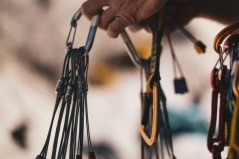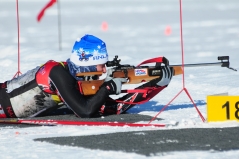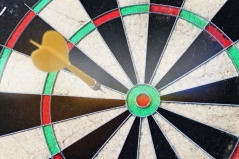In the shades of the rings – experiences of interpersonal violence in elite sports

keywords:
Olympics / Olympic Games Paris / paris / european championship / football / uefa / em / Germany / interpersonal violence / prevention / elite sports / prevalence
In the shades of the rings – experiences of interpersonal violence in elite sports
The pursuit of the Olympic dream is overshadowed by the pervasive issue of interpersonal violence in sport. Despite the challenges, a growing body of research and initiatives is dedicated to reshaping the culture of high-performance sports to prioritise athletes’ safety, integrity and health. Learn more about Olympics’ dark side: Abuse and neglect in elite sports. / more
Virtual reality training in Olympic sports: Promises and pitfalls

keywords:
Olympics / Olympic Games Paris / paris / european championship / football / uefa / em / Germany / virtual reality / training / Olympic athletes / performance / review
Virtual reality training in Olympic sports: Promises and pitfalls
The advent of virtual reality technology provides Olympic athletes and coaches with manifold new possibilities for training and competition preparation. Although promising and increasingly backed up by scientific research, it is important to be aware of the limitations and potential pitfalls of applying this new technology to the sports domain. / more
Unlocking the power of sports: the impact of Olympic values in prison rehabilitation

keywords:
Olympics / Olympic Games Paris / paris / european championship / football / uefa / em / Germany / PRISON / street / workout / well-being / REHABILITATION / SOCIAL COHESION
Unlocking the power of sports: the impact of Olympic values in prison rehabilitation
Discover how sports in prison foster empathy, health, and social reintegration. By practicing with the Olympic Spirit, inmates find a means to reconnect and rebuild themselves. A holistic approach that transcends barriers and provides a path to rehabilitation. / more
Psychological aspects of elite performance in new Olympic disciplines: The case of climbing

keywords:
Olympics / Olympic Games Paris / paris / european championship / football / uefa / em / Germany / climbing
Psychological aspects of elite performance in new Olympic disciplines: The case of climbing
In recent years, sports that have traditionally been practiced as recreational and non-competitive have been added in the official Olympic program. For example, climbing is on the Olympic program for Paris 2024 and Los Angeles 2028. This article provides an up-to-date overview of the relevant psychological aspects of climbing that are important for performance. We also discuss how sport psychology can contribute to current and future challenges in Olympic climbing. / more
Sleep before, during and after the Olympic Games: an important determinant of sports performance

keywords:
Olympics / Olympic Games Paris / paris / european championship / football / uefa / em / Germany / sleep / jetlag
Sleep before, during and after the Olympic Games: an important determinant of sports performance
This article focuses on the basics of normal sleep and the various sleep problems in competitive sports athletes. Strategies and tips for improving sleep behaviour of athletes before, during, and after major competitions such as the Olympic Games are be provided. / more
Thinking gold: the link between cognition and performance in olympic athletes

keywords:
Olympics / Olympic Games Paris / paris / european championship / football / uefa / em / Germany / cognitive performance / cognitive skills / interventions
Thinking gold: the link between cognition and performance in olympic athletes
In Olympic athletes, superior physical performance is clearly evident on observation. The non-visible cognitive processes also contribute to successful performance, yet they are still weakly researched and their mechanisms are unclear. With this article, we will provide insights into state-of-the-art research on the cognition-performance link in sports, focusing on elite athletes preparing for the Olympic Games. To do so, we will illustrate challenges associated with cognitive testing in the field of competitive sports, present solutions, and pinpoint how developing sport-specific vs. general cognitive measures can pave the way for individually tailored cognitive interventions. / more
The role of others' presence in sport performance under pressure

keywords:
Olympics / Olympic Games Paris / paris / european championship / football / uefa / em / Germany / performance / presence of others / social faciliation and inhibition / choking under pressure
The role of others' presence in sport performance under pressure
The presence of other people is inevitable in sport and dealing with it is crucial for high-level performance. This article presents the potential explanation of social inhibition or choking under pressure in competitive contexts due to the presence of others and suggests ways to help athletes to prevent them. / more
Use your breath to gain a performance advantage

keywords:
Olympics / Olympic Games Paris / paris / european championship / football / uefa / em / Germany / Breathing techniques / slow-paced breathing / Fast-paced breathing / Voluntary hyperventilation / Breath holding
Use your breath to gain a performance advantage
Editor: Elisa Bisagno
Editorial Assistant: Rinat Meerson, Sofia Calderon This article has also been translated into German, French and Italian.
Inhale. Exhale. Inhale. Exhale. Are you mindful of your breathing pattern? In sports, having control over one’s own breathing pattern and its regulation represents a prominent advantage. The authors draw upon empirical findings, providing an overview of the science behind voluntary breath modification and its role in Olympic athletes’ performance.
Consider the example of... / more
Players behind the scenes: How parents join their children’s road to the Olympics

keywords:
Olympics / Olympic Games Paris / paris / european championship / football / uefa / em / Germany / kids in sports / parenting / Support / Parent-Child Relationship / Youth / Elite Sport
Players behind the scenes: How parents join their children’s road to the Olympics
At the end of their Olympic careers, many athletes acknowledge the contributions of a hidden participant: their parents. In the present article, the authors review the pivotal impact of parents’ support for children’s development and success in elite sports and share insights on what constitutes positive parental involvement. / more
Essential psychological aspects of the Olympic Mind

keywords:
Olympics / Olympic Games Paris / paris / european championship / football / uefa / em / Germany / perfection / focus / mastery / resilience / mental
Essential psychological aspects of the Olympic Mind
It is a common myth that perfection and ‘rising above yourself’ are required to clinch Olympic gold. Very rarely, however, do athletes realize a perfect race or match. If athletes nonetheless focus solely on this inspiring but virtually unattainable goal, they may underachieve in the big moments. From a psychological perspective, peak performance is also about controlling the controllables, acceptance, composure, focus on the task at hand, limiting performance losses, and being prepared for setbacks. / more
